|
40 London Road
Strood
01634 726729
https://whatpub.com/coach-horses
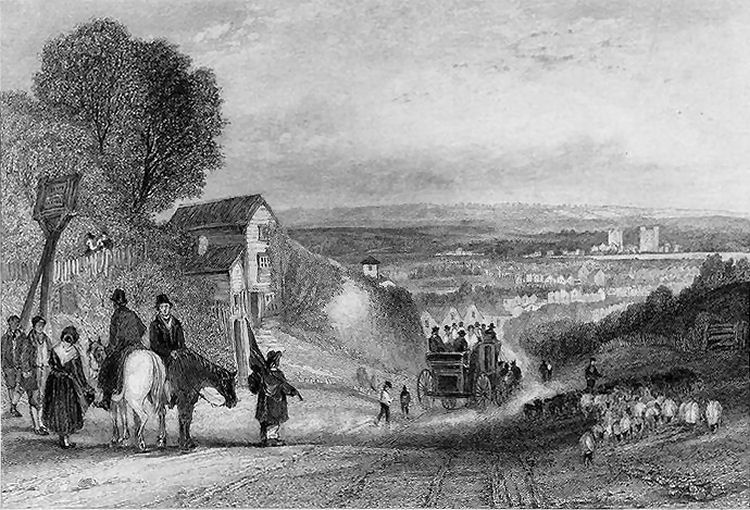
Above engraving 1840. Kindly sent by Arthur & Francis Wallington. |
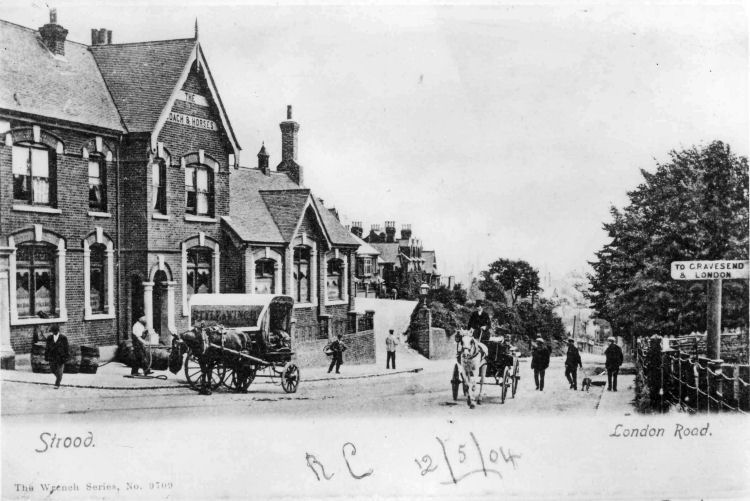
Above Photo of circa 1904. Kindly sent by Peter Moynahan. The dray
outside the pub is one of Style and Winch's wagons. |
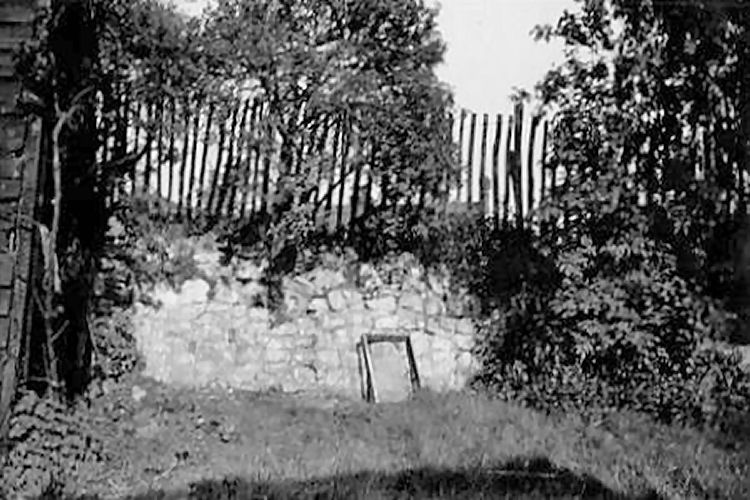
Above photo showing an ancient chalk block wall retaining a bank at the
back of the pub circa 1938. |
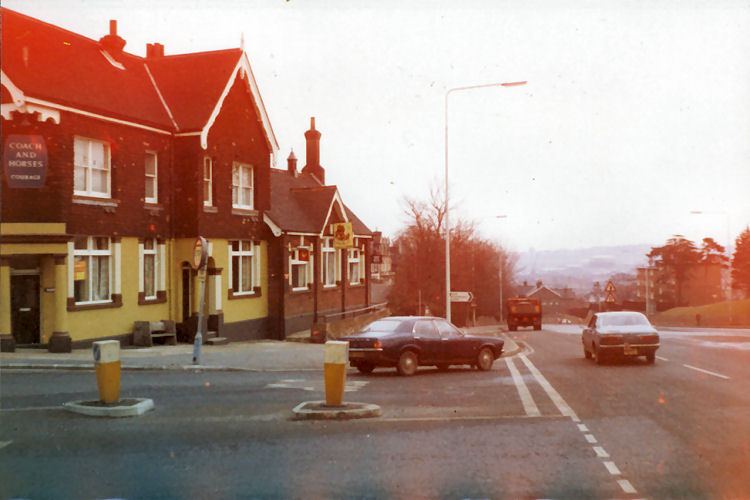
Above photo 1978, from www.Flickr.com
by Ben Levick. |
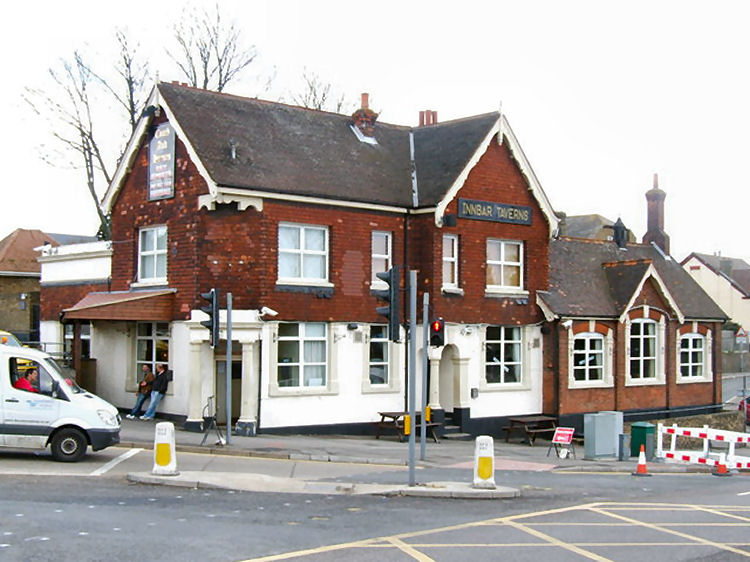
Above photo 2010 by Chris Whippet
Creative Commons Licence. |
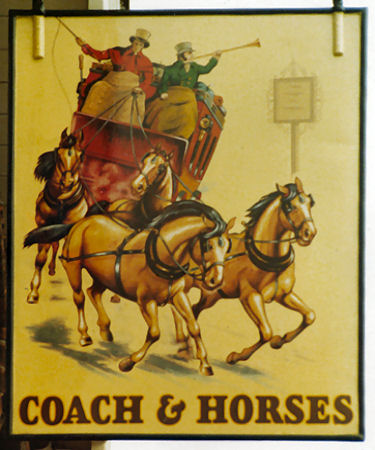 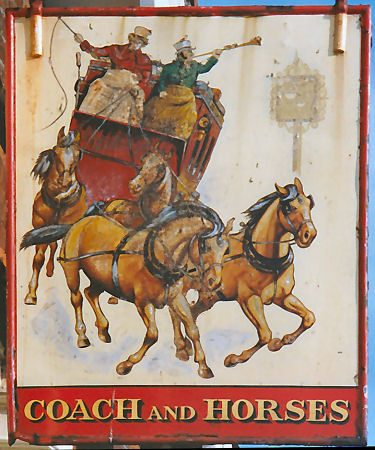
Above sign left 1978, sign right, September 1992.
With thanks from Brian Curtis
www.innsignsociety.com. |
|
Kentish Gazette, 30 April, 1774.
To be let immediately.
A good accustomed public house, situate on the Dover Road, about a
mile from Rochester, and commonly called
the "Coach and Horses," on Strood Hill, together with two Gardens,
Stables, Yard, Coach Lodge, &c.
For further Particulars, inquire at the above house, on Strood Hill.
|
|
From the Kentish Gazette, 4 May 1774.
TO BE LET IMMEDIATELY.
A Good accustomed PUBLIC-HOUSE situate on the Dover Road, about a Mile
from Rochester, and commonly called the "Coach and Horses," on Strood
Hill, together with two Gardens, Stables, Yard, Coach Lodge, &c.
For further Particulars, inquire at the above House, on Strood Hill.
|
|
12 July 1791.
Insured:- James, Richard and George Best, Kent Brewers.
Coach and Horses:- ROWE, victualler.
|
|
From The Morning Post ( London, England,) Thursday, October 16, 1823.
(Copied from The Maidstone Journal).
Monday last the body of a respectable person was found lying in a hop
garden near the "Coach and Horses" public house, Strood, which upon
inspection presented a shocking spectacle, the throat was cut, one ear
mangled, and several wounds inflicted on the body, apparently with a
penknife; near the body was found twenty-five sovereigns, a ten pound
note, and a gold watch. The only conjecture at present is, that in a
state of mental aberration the unfortunate individual must have put a
period to his existence. In his pocket was found a physician's
prescription addressed to an apothecary in London, which has been
forwarded, and, we hope, will lead to the discovery of the cause of this
melancholy transaction. The initials G.B. were marked on the hat. The
body was taken to the "Coach and Horses."
|
|
Kentish Gazette, 2 March 1847.
CONFESSION AND COMMITTAL OF AN INCENDIARY AT ROCHESTER.
On Wednesday, at the Guildhall of this city, an investigation, exciting
intense interest, was gone into before Capt. Thos, Baker and several
other borough justices, regarding a very respectably dressed man, about
36 years of age, who had surrendered himself at the station-house as the
individual who set fire to a stack of wheat on Sunday evening last, the
property of Mr. Thomas Mace, a farmer residing in Perry-street,
Gravesend. The hall was densely crowded, and many influential gentlemen
connected with this part of the county, and also county magistrates,
occupied sittings near the bench. The prisoner, on being placed before
the court, was dressed in mourning, and on being asked his name by Mr.
Prall, the magistrates’ clerk, declined to give it, alleging, as a
reason, that his friends were respectable, and that he did not wish them
to know the dilemma in which he had placed himself.
Clerk:— Have you no other reason to offer?
Prisoner:— With due deference to the bench, I withhold the information
of my name and connexions.
Mr. Tuff, the superintendent of the Rochester police, stated that the
prisoner came to the station-house and voluntarily gave himself up as
the person who fired the stack in question on the night of Sunday last,
about ten o’clock, by a lucifer match.
A man named Wilson stated that about seven o’clock on Sunday evening, as
he was walking along the path by the turnpike road leading from
Gravesend to Rochester, he came up with the prisoner, whom he found
standing in the path close to the hedge, and opposite to the stack which
was on fire; and he said to the prisoner, "This is a bad job." The
prisoner coolly and gentlemanly replied, "It is a great pity that corn
should be burnt, as there are so many poor people starving for the want
of it." From the gentlemanly appearance of the prisoner, he did not
think that he was the incendiary. Witness left him at the fire, and
walked home to Rochester.
William Wallis, landlord of the "Coach and Horses" at Strood-hill,
identified the prisoner as the gentleman who came into his house on
Sunday evening, about five o’clock, and in the bar he sat down and drank
two pints of beer, and smoked a pipe, and left about seven o’clock; that
he went to the door and bade him good night, and the gentleman walked up
the road as if he was going to Gravesend; and shortly after he heard of
the fire. The stack was about a quarter of a mile from his house.
Mr. Thos. Mace, the owner of the property, stated that the stack
contained from 40 to 50 quarters of wheat.
Wm. McGeorge, policeman No. 6, stated that he was on duty on the night
of Sunday last, and about 20 minutes to ten o’clock, as he was in the
High-street of Rochester, he saw the prisoner walking on the pavement,
and turn into the yard of the "Bull Inn, and on coming out be looked op
at the house, and said to witness, "I believe this is not the
station-house." Witness told him it was not, but that he would take him
to it if he wished; that they then went to the station-house, and on
being admitted Mr. Vine, the station keeper, inquired of the prisoner
his business, and he replied by asking the station-keeper if he had
heard of the fire; and being answered in the affirmative, the prisoner
said, "I am the person who set the stack on fire." The Superintendent
was then sent for, and to that officer the prisoner made a confession,
which Mr. Tuff took down in writing, and read to the court. Mr. Tuff
said that on searching tie prisoner he found on him one half-penny, a
cotton pocket handkerchief, and part of a number of Punch. The
Superintendent asked the prisoner his name, which he refused to give,
and said that he was aware of the consequences of what he had done, and
that he had a motive for it, and bought the lucifer box on the road of a
pedlar woman; and after lighting the stack he threw the box with the
lucifers into the hedge, about 100 yards from the stack.
On examining the prisoner's person, there are marks on his left arm M.C.,
and another letter A., and also an anchor and a dart. The prisoner
states that those marks were done when he was at school. The lucifer-box
was found about seven o’clock the following morning in the hedge, by
Stephen Clark, as described by the prisoner.
The prisoner, on being informed by the bench that he stood committed for
trial at the next assizes, and thut if he had anything to say it would
he taken down and used at his trial, said he was as innocent of the
charge as any gentleman in the room. When he left the "Coach and Horses"
it was his intention to have gone to Gravesend; a thought came, across
him that he would not be there till late, and not having any money, he
determined upon returning back, and thought he must do something to get
a bed for the night and a breakfast in the morning for nothing. The
lucifer-box he pulled out of his pocket and threw into the hedge. He
went to the station-house without thinking that any serious consequence
would follow, and refused to sign his statement.
The prisoner was removed the same day to Maidstone gaol. |
From a review by Steve C, June 2011:- "As I approached the "Coach and
Horses" late on Saturday afternoon I thought that it was closed due to the
scaffolding erected outside, but thankfully the door was open and the pub
was trading as usual. To the left of the entrance is the small public bar
that houses a fruit machine, projector screen and old fashioned cigarette
machine that wouldn't look out of place in a museum. Directly ahead of the
entrance is the large saloon bar that has a huge projector screen, pool
table and dartboard at the far rear. The bar is located to the left where
standard draught products are available alongside Bombardier and Courage
best on hand pump. There is a bit of a western theme behind the bar as there
is an old till of the sort that John Wayne would have thrown a few dollars
into and above the bar are some wooden boxes labelled with things like ‘colt
45, small arms'. I didn't spot any signs for Sky Sports, but I would be very
surprised if this pub didn't show the football etc. A jam night was
advertised for the Sunday, but I'm not sure if this was a one off or a
regular occurrence.
I found the staff and the locals to be very friendly in here and I would
have no problem returning in the future.
|
From an email received 30 November 2015.
G'day Paul
My Great, Great, Great grandfather had the "Coach & Horses," Strood
in 1871.
His granddaughter Mary Ann Jeffries (actually Mary Ann Jeffrey) died
at the "Railway Tavern" Sittingbourne age 99.
The "Coach & Horses" were rebuilt, and I understand the original was
demolished.
Arthur Wallingtion. |
Closed for a short time after 2011, the pub reopened again by 2015.
|
From an email received 22 January 2020.
When I lived in the Coach and Horses I used to see shapes and shadows along the top
landing. I always knew it was haunted.
Denise.
|
|
From an email received, 15 March 2021. I have just read the details
you have for this public house, I was researching it because I had found
a will for a James Cross. In it he says he is the owner of it but it
does not appear he was running it then as he names another person.
His will is proved April 1754, he left everything to his wife Mary,
to be left to his nephew James.
Carole Brett. I have now found the will for James Cross’s father,
Richard Cross, he died in 1735 and also left a will in which he says his
residence is the Sun in the Wood on Spittle Hill, Strood, his inventory
states he was a “Wittler”, which I assume is a Victualler. Could this be
the former name of the Coach & Horses?
|
LICENSEE LIST
CROSS James to Apr/1754 dec'd (owner)
ROWE ???? 1792+
COATES William 1828+

COSTEN William 1832+

WALLACE William 1841-47+ (age 40 in 1841 ) )
BURTENSHAW James 1851-62+ (age 55 in 1861 ) )
MUNN Thomas 1871+ (age 68 in 1871 ) )
FRYER Richard 1881 (age 48 in 1881 ) )
ALLEN Thomas & MUNN Mary Mrs 1882+
HOLDER Alfred 1891+
CARTER William 1901-03+ (also foreman of road making age 54 in 1901 ) )

HOLLAND Ernest James 1911-22+ (age 32 in 1911 ) )
JENKINS John 1930+
HILBURN George Henry
 1934-37+
1934-37+
WILDER Frederick George 1938-47 dec'd
WILDER Emily J (widow)
1947-60 dec'd
https://pubwiki.co.uk/CoachHorsess.shtml
http://www.closedpubs.co.uk/coachhorses.html
 From the Pigot's Directory 1828-29 From the Pigot's Directory 1828-29
 From the Pigot's Directory 1832-33-34 From the Pigot's Directory 1832-33-34
 From the Kelly's Directory 1903 From the Kelly's Directory 1903
 Census Census
|






